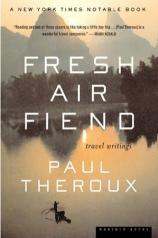Fresh Air Fiend: Travel Writings
Review
Fresh Air Fiend: Travel Writings
For
Paul Theroux, the seeds of wanderlust were planted early. Coming
from a large family, he spent his younger years longing to escape
the bustle of his daily existence, yearning for a space of his own.
He first sought this other world in books, calling reading both "a
refuge and an indulgence," but soon he found another refuge, hiking
the woods that bordered his family's home: "On my own, I had a
clearer sense of who I was, and I had a serious curiosity about
what I found in the woods. The taxonomy of the trees and flowers
and birds was a new language I learned in this new world."
Theroux has been traveling ever since and has documented his
worldly exploits in a plethora of books, many of which have become
travel literature classics. His latest, FRESH AIR FIEND, a
collection of writings accumulated over the last 15 years, is a
showcase for just how entertaining travel writing can be.
FRESH AIR FIEND is divided into eight sections: Time Travel; Fresh
Air Fiend; A Sense of Place; China; The Pacific; Books of Travel;
Escapees and Exiles; and Fugues. The essays in Time Travel deal
specifically with the various aspects of his creative process, the
dubious reliability of memory as well as Theroux's personal
opinions on the respect good travel writing should garner in the
literary world. In "Travel Writing: The Point of It," he states, "A
book has the capacity to express a country's heart, as long as it
stays away from vacations, holidays, sightseeing, and the
half-truths in official handouts; as long as it concentrates on
people in their landscape, the dissonance as well as the melodies,
the contradictions, and the vivid trivia --- the fungi on the wet
boots."
Theroux takes a magnifying glass to that fungi, and this quality in
his writing is what lifts him above the average travel
documentarian. From his kayaking adventures to his camping trips,
Theroux gives us stroke-by-stroke details with one difference ---
he comments as much on the inner landscape as the outer terrain. In
"Camping in the Snow," Theroux writes, "It is simply impossible to
explain except in metaphysical terms, yet who wants to hear a
camping trip deconstructed as a critical aspect of enlightenment?
The motives of this effort are a personal matter, yet no bystander
--- and no reader --- ought to be subjected to a pompous discussion
of the wilderness experience and the Meaning of Life. Nonetheless,
it is nearer to the truth to understand this passion of solitary
skiing along narrow forest trails in the winter as an exploration
of the heart and mind --- an inner journey."
Yet Theroux writes no dry dissertations on the metaphysical flights
of fancy his mind takes as his body is hurled through violent
waves, skates across snowfields, or trudges the weary miles of some
mountain trail. No, his gifts lie in the quality of the writing
itself, as in his description of the sky in "Down the
Zambezi:"
"In the extravagant African sunset, the Zambezi River was deep red,
reflecting the crimson sky, and it shimmered in oxbows across the
dusk-black landscape of the floodplain like a vessel thick with
blood."
China is brought to life in several essays. In "Down the Yangtze"
Theroux describes this great river of the Far-East: "The Yangtze is
China's main artery, its major waterway, the source of many of its
myths, the scene of much of its history. On its banks are some of
its greatest cities. It is the fountainhead of superstition. It
provides income and food to half the population. It is one of the
most dangerous rivers in the world, in some places one of the
dirtiest, in others one of the most spectacular. The Chinese drink
it and bathe in it and wash clothes in it and shit in it. It
represents both life and death. It is a wellspring, a sewer, and a
tomb; depthless in the gorges, puddle-shallow at its rapids. The
Chinese say if you haven't been up the Great River, you haven't
been anywhere."
It seems Theroux has been everywhere, from the islands of the South
Pacific to the wilds of northern Maine, from the Far East to the
Middle East. He travels the literary landscapes of Graham Greene,
Bruce Chatwin, Joseph Conrad, Daniel Defoe, Apsley Cherry-Garrard,
William Least-Heat Moon, and John McPhee. In one essay he gives us
an around-the-world litany of "Unspeakable Rituals and Outlandish
Beliefs."
Through all of the pieces contained in "FRESH AIR FIEND," the
reader is compelled to listen to what Theroux is saying, compelled
to read on, sensing that Theroux himself is such a good
listener...a listener not only to the people he encounters, but a
man with an ear to the ground, a hand cupped toward the horizon,
seeking out the mysterious whispers on the wind.
Reviewed by Vern Wiessner on January 22, 2011
Fresh Air Fiend: Travel Writings
- Publication Date: May 1, 2001
- Genres: Fiction
- Paperback: 480 pages
- Publisher: Mariner Books
- ISBN-10: 0618126937
- ISBN-13: 9780618126934




